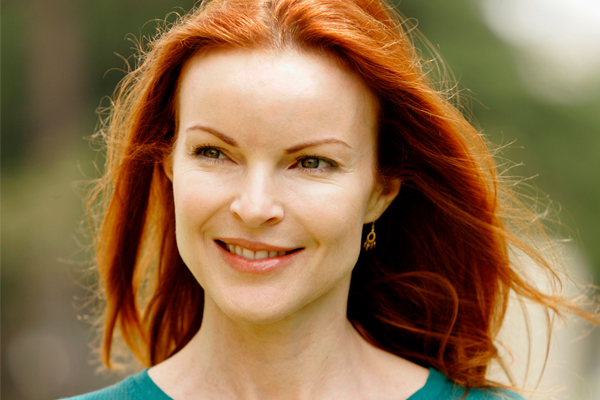You don’t expect a woman who’s gained fame as a Desperate Housewife to be a role model. But the woman who has played the tightly wound Bree Van de Kamp would just like to clarify that, in her off hours, she is not about to be “the poster girl for older mothers.” In a frank new interview in the British women’s magazine Easy Living, the actress, who turns 50 in March, discusses the twin daughters she conceived at age 44 and advises, “Your forties is not the time to be thinking about getting pregnant.”
Cross began in vitro fertilization treatments “a week after” getting married in 2006 and, unlike plenty of would-be moms her age, conceived easily. But the pregnancy itself proved a tougher ride, as she found herself on bed rest in the midst of her shooting schedule, developed preeclampsia, and delivered daughters Eden and Savannah four weeks early via emergency C-section. So when asked about how it feels to be a beacon of hope to other aspiring 40-something parents, it’s no wonder that Cross says, “Are you kidding? It’s a miracle I have these two daughters.”
We live in a world where marriage and children simply don’t always drop into a lady’s lap at a conveniently fecund juncture. We also, for the lucky, healthy and well-insured, now have ever improving odds-boosters in the realms of fertility treatments and prenatal care. Is it any surprise that the number of women having children in their 40s has increased a whopping eight-fold in the last four decades? The technological options are seemingly endless. Angela Bassett and Courtney B. Vance are the parents of twins they had via a surrogate when Bassett was 45. Annie Leibovitz gave birth to her eldest child when she was 51, and had twins via a surrogate four years later.
But just because you might be able to have a baby while your peers are having hot flashes, does that mean it’s a great idea? In a provocative cover story last fall, New York magazine pondered whether reproductive science has gone too far, granting motherhood to women far beyond the natural span of their childbearing years. The response to the story – and the tales of couples enduring multiple rounds of IVF, of the risks to mother and child, and the implied rich-chick privilege of outfoxing the clock – was so strong that commenters are still hashing it out four months later. And just this past Friday, Dr. Oz devoted an entire show to the question “How Old Is Too Old to Have Kids?” Doctors debated the issue, pointing out both the ever improving possibilities for safe, healthy pregnancies for older women while also laying out the stark realities of the physical and financial toll of later age motherhood. For every Marcia Cross, who makes it through a bumpy pregnancy and can now say, “It worked out and I love being a mother,” there are women like the reproductively prolific 45-year-old Michelle Duggar, whose last child, Josie, was born premature at only 1 lb. 6 oz. Last month, Duggar lost another child five months into her pregnancy.
Motherhood isn’t something that a whole lot of women capriciously decided to give a go at 45, like they’re taking up Zumba classes. Deferred parenthood often comes as the result of life circumstance and the caprices of fertility. Yet the cold, hard truth is that the dream of parenthood doesn’t always come true for everybody. And that the possibilities for pain, loss and heartbreak tend to rise as the number of eggs decline. Biology can only be defied just so much. The odds get slimmer every month, and the world gets less kind about your choices and efforts.
But a few days ago, an over-40 pair of friends finally welcomed a long-hoped-for baby. Looking at photographs of the weary, elated face of the mom and the proud, awed new father holding, at last, his beautiful son, I remembered how much they’d endured to bring him into the world. I doubt they’d want to be anybody’s poster children, either. But I know they’d say it was all worth it.

